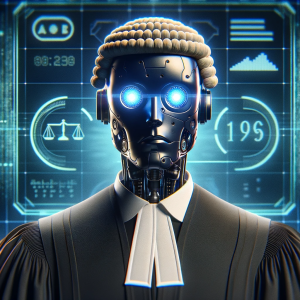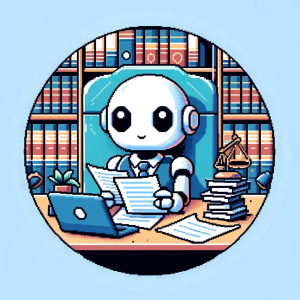
Human Judges vs. AI in Criminal Trials: Who Do Jurors Trust More?
In honor of the cracking legal thriller, Juror #2, let’s take a look at some research into the trial process.
Imagine stepping into a courtroom, accused of a crime. You glance at the bench, expecting a stern-looking judge in a black robe, but instead, a sleek, glowing AI screen stares back at you. Would you trust its judgment? Would a human judge feel more… human?
As AI increasingly infiltrates areas once dominated by human expertise, one big question looms: Do people trust AI in high-stakes decisions, like criminal sentencing? A new study put this to the test, exploring whether jurors defer more to human judges or AI when deciding a defendant’s fate. The results? Not what you might expect.
The Experiment: Human Wisdom vs. Machine Logic
Researchers in Japan conducted two online experiments with over 3,400 participants, giving them mock murder trial scenarios. Each participant had to decide on sentencing under two conditions:
- With Mitigating Circumstances: The defendant had a morally complex backstory, such as being a victim of domestic violence or caring for a terminally ill family member.
- Without Mitigating Circumstances: The defendant committed the crime for self-serving reasons, like wanting to escape a burden.
Participants were also given sentencing recommendations from both a human judge and an AI. Sometimes these recommendations aligned, but in other cases, they conflicted—forcing jurors to decide which to trust more.
The Shocking Outcome: No Clear Winner!
One might assume that when emotions and moral nuance come into play, people would overwhelmingly side with a human judge. After all, AI lacks empathy, right? But the study found something surprising: Jurors showed no strong preference for human judges over AI.
Even in cases with mitigating circumstances—where a judge might be expected to weigh the human element more than an algorithm—participants still didn’t lean decisively toward human decision-making. Their choices were primarily influenced by the circumstances of the case rather than the source of the sentencing recommendation.
This suggests that, when it comes to criminal justice, people might already be open to AI playing a bigger role than we thought. But should they be?
Why Does This Matter? The Future of AI in Courts
AI in the courtroom isn’t just science fiction. It’s already happening. Some legal systems use AI to analyze case law, assess risk levels for bail decisions, and predict sentencing outcomes. The appeal? AI can be objective, eliminating human biases, inconsistencies, and emotional influences that sometimes lead to unfair rulings.
But here’s the catch—AI isn’t perfect. Algorithms are trained on historical data, which means if past legal decisions were biased (spoiler: they often were), AI might reinforce those biases rather than eliminate them. Plus, there’s the “black box” problem—many AI models are so complex that even their developers can’t fully explain how they reach their conclusions. In a legal setting, transparency matters, and a system that can’t explain itself is, at best, controversial.
Are We Ready for Robot Judges?
The study’s findings challenge the assumption that people instinctively reject AI in moral or ethical decision-making. In reality, many jurors seem willing to accept AI-generated judgments, at least in controlled experiments. But real-world courtrooms are messier, more emotional, and deeply tied to human values. Can an AI truly deliver justice if it lacks the ability to feel or reason beyond the data it’s trained on?
For now, AI isn’t replacing judges—it’s more of an assistant, helping with legal research, case predictions, and risk assessments. But if future studies continue to show that people trust AI as much as human judges, we may soon be grappling with a much bigger question: Should AI ever have the final say in matters of justice?
Let’s Explore Together!
What do you think—would you trust an AI judge with your fate? Do you believe AI could bring more fairness to the justice system, or does it risk stripping away the human element that makes justice… just? Drop your thoughts in the comments and share this post with your friends—let’s debate the future of AI in the courtroom!
Fun Thought Experiment:
- If you were on trial, would you rather be judged by an AI that’s “perfectly objective” or a human who might understand your emotions but also have biases?
- What’s the wildest or most surprising way you’ve seen AI used in real life?
- Would you feel more comfortable with AI making decisions in small legal matters, like traffic tickets (like the one I got this morning 😐 ) before moving up to criminal trials?
Science is reshaping the world, and the law is no exception. The only question is—are we ready?
Explore and Learn with Science:
Now, more than ever, we need science to guide critical decisions. Dive into groundbreaking research and inspiring stories with This Week in Science! Perfect for teachers and science enthusiasts, our free weekly newsletter gives you the tools to expand your knowledge and fight misinformation. Act now—join today to make sure science has a louder voice in shaping our future. If you liked this blog, please share it—your referrals help us amplify science’s impact.



